- Home
- Bruce Sterling
The Artificial Kid
The Artificial Kid Read online
The Artificial Kid
Bruce Sterling
1
Reverie shines, the planet’s edge lined in luminous atmospheric haze, her broad, shallow seas sparkling, her big coral-atoll continents brown and green and white through rifts in scattered clouds. The sky over Telset, my island city, is clear as glass as the camera zooms in; I was careful to check with the weather satellites before I did the taping. The effect is serene and hypnotic; and the camera accelerates downward and the gridwork of my city expands with nearness, to a single block, a single street, a single person, me, and my own image swells to fill the screen. The soundtrack says:
“Ladies and gentlemen, the Artificial Kid. This tape is made possible by Mr. Richer Money Manies and the Artificial Kid. Copyright C.R.Y. 499 by the Artificial Kid for Cognitive Dissonant Enterprises, Reverie.”
Most of my audience are floaters, who circle our coraled planet in city-sized orbital oneills. I draw them down to the planet’s surface, I involve them personally during those first thirty seconds of tape. Orbital Reverids think of Reverie as lovely, but remote, and surface dwellers like myself as rather quaint and sweet. I break down that distancing effect. I stare right into the descending camera, my slightly slanting eyes blacklined in kohl and as cold and mean as an adder’s. I challenge the viewer. I believe in direct challenges; they’re at the heart of combat artistry.
People used to ask me how I became a combat artist and why I’m called the Artificial Kid. People stopped asking such prying questions after I ruthlessly beat them up. Every formal interview I’ve given has ended with me “losing my temper” and soundly clubbing the journalist. Now, the days have passed when I found it necessary to establish a reputation for fury and volatile violence. Now, I intend to tell all.
Why, then, do people call me the Artificial Kid? My answer is that all combat artists must have a gimmick, and mine has always been my childishness and wild artificiality. “Kid,” on Reverie, means a young person, but the word also has a certain raffish air of irreverent disrespect.
I’ll explain further with an analysis of my tape image, an image I know well, an image, in fact, that obsesses me. Many times, I have risen at sunset and worked straight through the eighteen-hour Reverid night, editing and polishing my own tapes for Mr. Manies and the market. The image on the tape is that of a very young man. He is resiliently, but not heavily, muscled; his skin is suntanned dark brown under a thin, shiny film of green skin oil. He is short, about five feet four. He wears a thick armored leather surcoat over his torso, held up with two wide shoulder straps; a stiff, heavy collar shields the back of his neck. He wears a pair of gleaming metallic scale trousers with elastic waist and cuffs, and shiny black combat slippers. His head seems slightly oversized for the childish body; his face is unlined and beardless, with wide cheekbones, a pointed, narrow chin, and eyes with an epicanthic fold, heavily outlined in black. His hair is unusual; each strand of hair is separately laminated in plastic, forming a jackstraw array of stiff, black, pointed quills. Floating about him in the air are six small, silent camera modules, each with two lenses and sound recording equipment, each carefully programmed. These floating cameras are with him always.
In his right hand he casually grips his nunchuck. This weapon consists of two slightly tapering eighteen-inch clubs of blood-repellent padded black plastic, linked at their thin ends by eight inches of crystalline metal chain. He grips one club about half-way up its length and lets the other dangle. The solid metal core beneath the plastic assures a satisfying kinetic impact, while the slight malleability of the plastic provides stunning bruises rather than the actual mangling and spattering that a solid metal ’chuck would cause. Above all the Artificial Kid believes in theater. Theater is having opponents fall at your feet, stunned, numb, and nerveless. Theater is not gouging out great bloody chunks of flesh.
The Artificial Kid moves with resilient grace. He is aware at every moment of the exact position of every inch of his body, and his nunchuck moves like a living thing, absolutely obedient to his will because of his ninety-eight long years of practice. “Ninety-eight years, Kid?” I can hear my audience ask. “Isn’t that seventy years longer than you’ve been alive?” So it is. And that’s why I’m the Artificial Kid.
I happen to have the first moments of my “birth” on tape. They were taped by Professor Crossbow, my tutor and mentor for the first twenty years of my life, a person to whom I owe a profound debt. It was clever of it (Professor Crossbow is a neuter, so I will refer to it as “it,” the pronoun it always preferred) to put the close-up on my face. In the first few minutes of the tape it is obvious that, despite the fact that he says nothing, we are looking at Rominuald Tanglin, my previous personality. He is two hundred and seventy-one standard years old and looks every day of it. The lines of madness are in his face; his eyes shift rapidly from side to side like hot black ball bearings; there is tension in the pale thinness of his grizzled lips. He is about to commit mental suicide. His hair is shoulder length and frivolously curled in the old style; there are half-a-dozen shaven spots where the metal contacts will touch his head, and they lend the proceedings a peculiarly makeshift air.
The machine that will kill him descends from above him, extruding six gleaming contacts. Tanglin still says nothing, but his throat moves visibly. The contacts touch; there is a discharge; Tanglin dies instantly and his eyes close. His face sags in total relaxation. The narrow jaw drops and a thread of drool forms at the corner of the lower lip; Crossbow’s hand appears to touch it away with a sponge. The body, momentarily empty of any personality, sags in the chair, but transparent plastic braces, barely visible, keep the head upright. Tears form in the opened eye ducts and slide down across the broad cheeks. The memory eraser has done its work. Tanglin’s mind is gone, his personality is scorched away. The machine rises from the head. Quickly, Crossbow touches away the tears and removes the head brace. Within seconds, consciousness returns, I am born, and I lift my head.
“Hello,” Crossbow says gently. Wondering, I lift my hand and touch the cool dampness on my cheeks. “Hello,” I say as I rub my eyes with two fingers.
CROSSBOW: Do you know who you are?
SELF: Yes. I’m R.T. [pause] R.T. Arti. [I move my mouth, tasting the words]
CROSSBOW: And do you know who I am?
SELF: Yes. You’re my friend, Professor Crossbow. And we’re in your house, on Reverie.
CROSSBOW: [with infinite gentleness] Very good! [I smile radiantly] Let’s try to walk a little now, Arti, shall we? That’s right. [I get up from the chair. Though I am newborn, my body has not forgotten its reflexes. I begin to pace around the room with the unnatural assurance and grace that comes from hundreds of years of experience. The camera follows us. The memory device looks ugly, bulky, and angular in Crossbow’s room, amid its warm, tasteful driftwood panelling, its dangling mobiles and air chimes, its glass terraria and aquaria, its tape display screen.] There. How do you feel now, Arti?
SELF: I feel just fine, Professor.
CROSSBOW: Wonderful! Now drink this [it hands me a ceramic cup full of a thick dark liquid practically crystallizing with testosterone inhibitors] and then I’ll take you for a swim out on the reef. After that we’ll have a nice lunch, and then we’ll start your lessons. You’re not sleepy, are you?
SELF: [putting aside drained cup] No! [eagerly] Let’s go swimming!
The tape ends when we go out the door. Crossbow was not especially enthusiastic about taping, except of course in its scientific work, where a rigorous recording of every step of scientific procedure is demanded by the Academy.
Not so Rominuald Tanglin. Tanglin, or “Old Dad” as my friends and I have come to refer to him, was a fanatical believer in the potency of tape. He was an
image builder, at one time one of the planet Niwlind’s most powerful politicians (and that on a world known for the maddening intricacy of its intrigue). I can’t help but feel that I’ve inherited some of his remarkable abilities in this field.
It must have hurt Tanglin to erase the hundreds of years of taped memories in the personal computer I inherited from him, but he knew that the vast bulk of memory there would have crushed a young, developing personality. Even so, he left me the record of his last two years, severely edited, as his echoing, gesticulating legacy. This computer, a highly advanced Niwlindid model, was specially designed for Tanglin; he understood it far better than I ever will. He cunningly hid his last tapes in there somewhere, part of a virus program that resurrected them and played them at apparently random times. The tapes were addressed to me personally, usually by a full-faced, insanely earnest Old Dad. He always addressed me as “Kid” or “Son,” so that not even my closest friends knew our true relationship.
How often have I been playing breathless tapes of my own combative exploits, only to have Old Dad pop up, raving? Dozens of times at least; in fact, his projected hologram was constantly haunting my house. He would lecture me on politics, or on the perfidy of his wife Crestillomeem, or on the lurking presence of the alien creatures he called “leeches.” These “leeches” were his particular obsession during his last months. He claimed to have learned his nunchuck techniques to protect himself from “Them.” “They” were degenerate survivors of the Elder Culture, he insisted; gray-skinned and rubber-boned, with brittle, hollow skulls lined inside with coarse black fiber. Of course, his insane assertions had no shred of backing evidence. Once I’d grown up, I no longer believed him.
There were hundreds of tapes. He must have done at least one a day during the two years of decontamination in the orbiting emigration oneill. During his last week, in Professor Crossbow’s house off the Tethys Reef, sixty miles from Telset, he edited them. Some tapes, especially the ones where he gives the details of his paranoid theory regarding the Elder Culture, radiate an intense conviction that demonstrates how he managed to rise to the exalted position of First Secretary of the Niwlindid government.
Why did I become a combat artist? Well, what else was there? I was young, though I still had the habitual grace of age. My body still remembered its combat training. And combat art is a young person’s pursuit; it takes the vitality of youth, its carelessness, its reckless self-assertion. This modern age is a hard one for the young. Our remote ancestors, and some contemporary humans dumb enough to live on low-technology planets, died early, sometimes before a single century of life. They didn’t live on and on, smothering their sons and daughters with the weight of their centuries of power and experience. It’s hard to find room to breathe when you’re young; it’s hard for someone two hundred years old to acknowledge the adulthood of someone eighteen. One answer on Reverie has been the Decriminalized Zone, an area freed of legal and social restraint.
When the Decriminalized Zone was first opened, twenty years ago, corporate citizens were shocked and titillated by the spontaneous anarchic violence that broke out among the small gangs of roving, idle, bored, and defiant delinquents. Their vicious activities aroused interest and sympathy among others suffering from a similar frustration. Bootleg tapes of people being savagely beaten up found a larger and larger audience, and not only among the young. Viewer money began to pour into the industry. Combat art forms sprang up, the original undisciplined hoodlums were quickly disposed of, and combat art became a profession.
In the Professor’s house northeast of Telset on the shore of the continent Aeo, I was a devoted follower. The Professor disapproved at first, but it wisely left me to my own devices as I grew older. In fact, I saw less and less of the old neuter as it spent longer and longer hours exploring the reef and documenting its incredibly intricate Reverid ecology.
One day I simply left the Professor a note and took my sailboat to the city. In two weeks I was established and I came back for my computer. My note was gone, but so was the Professor. My departure had freed it of its last responsibility. I imagined that my old tutor had gone completely marine and simply moved under the surface of the Gulf of Memory.
I soon found that I loved Telset. She is an island, twelve miles long, five wide, set like a jewel in the shallow gleaming waters of the southern Gulf of Memory. She is shaped like the footprint of a pointed slipper. The northern tip is Prospect Point; the original city, Old Telset, is in the middle of the eastern shore. Orbiters can see the Gulf as a whole: an ocean-sized lagoon, almost completely encircled by the vast coral-crusted arms of the continent-sized atoll we call Aeo.
Five hundred years ago, the pioneer Reverids cooked Telset to a state of red-hot viscosity with powerful orbital lasers, killing all native life. When she cooled, they stocked her sterile soil with their own flora and fauna, mostly Niwlindid stock. The alien species did well, but as the centuries passed they began to succumb to highly evolved native species that were washed ashore or carried by birds. Now the island is a riotous scramble of species from a dozen planets, each seeking a niche in a chaotic, cosmopolitan ecosystem.
The boundaries of the city of Telset are vague; her modern villas, of limestone, travertine, marble, metal, and wood, are scattered throughout the island. They are hidden in the woods and half-buried in the reefs; they loom from the shoregrass, they nestle in dells and creeks and hollows. Telset is wired, which does away with the need for compactness. The primary recreation of her citizens is tape: drone tape, art tape, life tape, memory tape. That’s the way we are.
I’ve explored all of Telset on foot or by drone. I know the dense-packed, thickwalled, deserted buildings of Old Telset like the back of my hand; most of Old Telset is now the Decriminalized Zone, my stage and arena. I know the channels of the Telset Reef well, too; I’ve sailed them all in my little skiff, the Sea Whip, and explored them while swimming or with aquatic drones. I’ve seen sea beavers, mudcumbers, skates, and rays; I’ve seen kittiwakes, skeiners, skimmers, and cormorants. I’ve seen great mud-belching holothurians, as big as houses, hauling their rubbery bulk to shore, and I’ve touched them with my hands. I’ve seen great crusted cylinders of Tower Coral, two stories high; I’ve climbed them and dived from the top. I’ve seen Telset, touched her, heard her, tasted her, and smelled the sharp brine of her ocean air. And best of all, I’ve known her people.
Those among my audience who have closely followed my career (and I’ve known some to have whole libraries of my tapes) know that I started my career as a junior gang member of the Cognitive Dissonants, a group led for the last eight years by that resplendent couple, Chill Factor and his Ice Lady. Chill and Icy were responsible for my development as an artist and tape craftsman. The fact that I have sometimes challenged and beaten up members of their gang (Six Fingers, Hammer, Million Masks, Happy Daze, Flying Bill Flatbeak, Chains, Brains, Sumo, Hobble, and Twinkles) should not blind anyone to the sincere affection I feel for all these extraordinary fighters and artists.
They bought me my first cameras. They gave me innumerable tips on the correct dramatic presentation. They bought me my first smuff, helped me find my first home. They taught me gang etiquette, and the rituals of combat art and the artists’ Code. The Code rules our lives. If not for the Code, we would all have killed each other years ago.
Of course, that was eight standard years past. Since then I’ve climbed to the top of the bloody flagpole.
Combat artists, even in this day of technomedicine, spend a lot of time healing up. You can’t fight all the time, there are limits: medical bills and smuff. Limits enough so that even the top ranks are only moderately well off by the standards of Reverid richesse. But money isn’t everything; in fact, to my youthful mind, fame and a fearsome reputation meant much more. And I had enough money to live comfortably and securely in the Decriminalized Zone, thanks to computerized alarm systems, royalty payments, a steady supply of smuff, and my housekeeper, Quade Altman.
Why did I have
a human housekeeper when I could have had all her not-very-onerous tasks done by machine? Not for sexual gratification, obviously; I’ve stayed on libido suppressants ever since Professor Crossbow first gave them to me. My hairless face and high-pitched voice attest to that. Nor was it an attempt to conform to the typical practices of status-conscious, dominance-conscious Reverids. No, I kept her because she begged me to.
I still have the tape of our first meeting. I just couldn’t resist her plea when she knelt amid the rubble of her three-dimensional mosiacs to look me eye to eye. (I’m five feet four, while Quade approaches eight feet.) Two members of the Perfect Stranglers had broken into her Zone studio to hide from the Cognitive Dissonants during a gang clash. Being uncouth louts, they amused themselves by smashing her works of art—excellent three-dimensional mosaics, if you like that form of expression, which I do. Unfortunately for them, Quade’s falsetto screams and the brittle crunching of the mosaics’ multilucent panels alerted me and I broke in to gloriously beat them both to pulps. It was wonderful; the cameras caught everything, and Quade took her cue beautifully in an impromptu performance that had me gasping with admiration. She fell to her knees, threw her incredibly long, skinny arms around my neck, and begged, literally begged me to protect her and take her to safety. I hesitated; in those days I was obsessed with projecting an image of utter inhuman ruthlessness. Finally, reflecting that I could always edit the tapes for publication, I agreed, and she actually swooned with relief. I later learned that she swoons a lot anyway, due to various blood circulation problems caused by Reverid gravity, but it was a great performance and she’s done some of her best mosaic work in my house.
She’d been with me two years. I was healing up from a fractured shin, watching a drone tape, doing a little nicotine. Quade came into my tape room, carrying a light nighttime brunch. “The stars are beautiful tonight,” she said vaguely. Her face was flushed; her eyes were glazed, and the peculiar yellowness that sometimes filmed her eye-whites was gone. I didn’t know what was wrong with Quade but I naturally assumed it had something to do with sex; she had no lover. I had been trying for two years to get her onto libido suppressants, but with sporadic success. “Rub your back?” she piped. “Shift your pillows? Help you rub on your skin goo? Bring you your weights?”

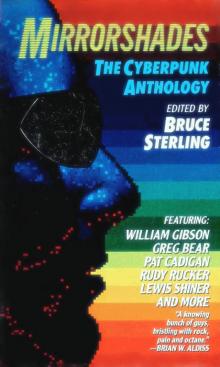 Mirrorshades: The Cyberpunk Anthology
Mirrorshades: The Cyberpunk Anthology The Wonderful Power of Storytelling
The Wonderful Power of Storytelling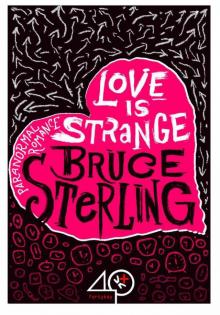 Love Is Strange (A Paranormal Romance)
Love Is Strange (A Paranormal Romance)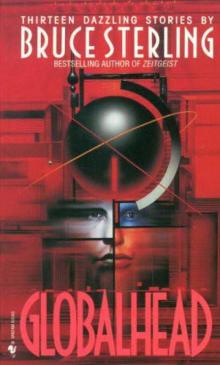 Globalhead
Globalhead Essays. FSF Columns
Essays. FSF Columns The Hacker Crackdown
The Hacker Crackdown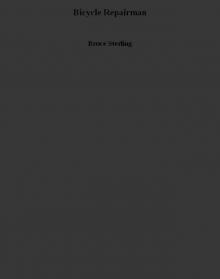 Bicycle Repairman
Bicycle Repairman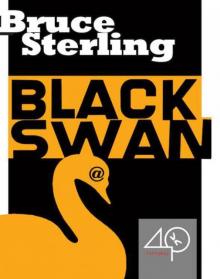 Black Swan
Black Swan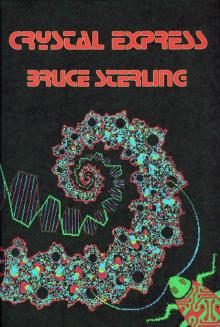 Crystal Express
Crystal Express Islands in the Net
Islands in the Net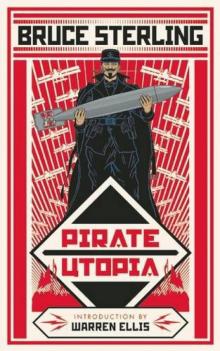 Pirate Utopia
Pirate Utopia GURPS' LABOUR LOST
GURPS' LABOUR LOST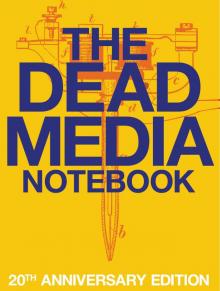 The Dead Media Notebook
The Dead Media Notebook Unstable Networks
Unstable Networks The Manifesto of January 3, 2000
The Manifesto of January 3, 2000 Heavy Weather
Heavy Weather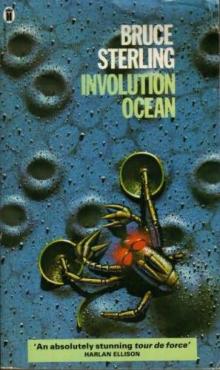 Involution Ocean
Involution Ocean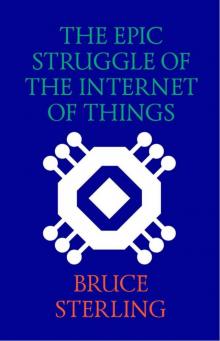 The Epic Struggle of the Internet of Things
The Epic Struggle of the Internet of Things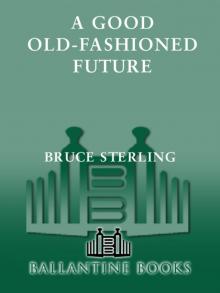 A Good Old-Fashioned Future
A Good Old-Fashioned Future The Littlest Jackal
The Littlest Jackal Zeitgeist
Zeitgeist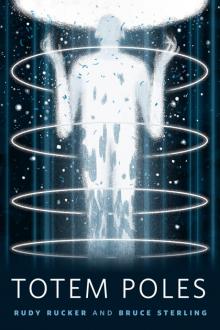 Totem Poles
Totem Poles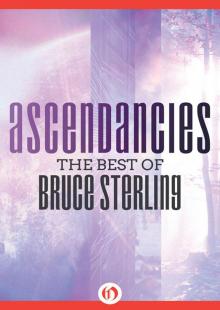 Ascendancies
Ascendancies CyberView 1991
CyberView 1991 War Is Virtual Hell
War Is Virtual Hell Taklamakan
Taklamakan Holy Fire
Holy Fire Cyberpunk in the Nineties
Cyberpunk in the Nineties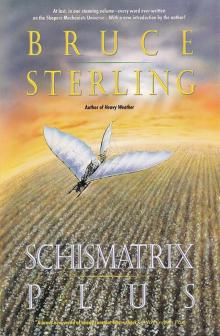 Schismatrix Plus
Schismatrix Plus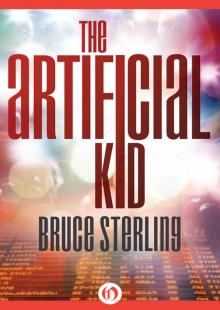 The Artificial Kid
The Artificial Kid Essays. Catscan Columns
Essays. Catscan Columns Maneki Neko
Maneki Neko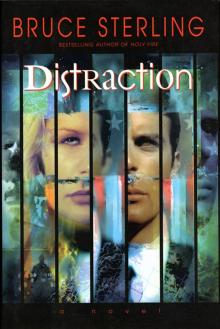 Distraction
Distraction In Paradise
In Paradise Red Star, Winter Orbit
Red Star, Winter Orbit Luciferase
Luciferase